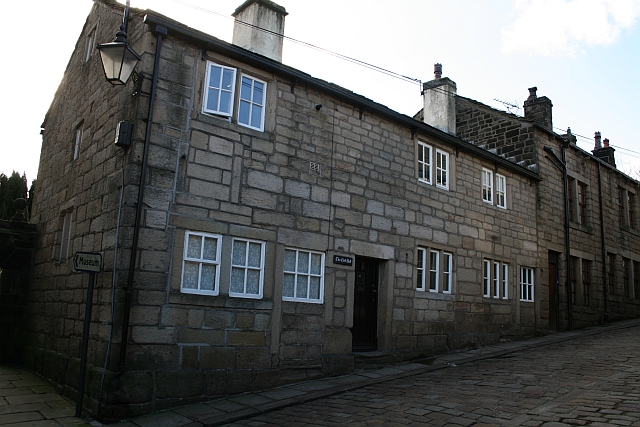Heptonstall is a small village and civil parish within the Calderdale borough of West Yorkshire, England. Historically part of the West Riding of Yorkshire, the population of Heptonstall, including the hamlets of Colden and Slack Top, is 1,448. The town of Hebden Bridge lies directly to the south-east. Although Heptonstall is part of Hebden Bridge as a post town, it is not within the Hebden Royd town boundaries.
The village is on the route of the Calderdale Way, a 50 miles (80Â km) circular walk around the hills and valleys of Calderdale.
History

Heptonstall was the site of a battle during the early part of the English Civil War in 1643.
Historically a centre for hand-loom weaving, Heptonstall's cottages and terraced houses are characterised by large first floor windows to maximise the light for weaving.
The older churchyard claims "King" David Hartley amongst notable graves there. Hartley was founder of the Cragg Coiners and lived as a rogue in the Calderdale area until he was hanged at Tyburn near York in 1770.
The foundation stone of its octagonal Methodist chapel, the oldest still in continued use, was laid following the visit of John Wesley in 1764.
In the mid-1980s the paving on a road through Heptonstall was removed, revealing the original stone setts. Although there was a plan to remove the setts, local protests convinced the council to restore them. At the same time the existing concrete street lights were replaced with late 19th century cast-iron gas lamps from the. Both developments acted as a traffic calming measure.
Community

A local park is used for sport and includes a playground for children. Around Heptonstall are walking and cycle routes.
A small local history museum [3] is based in what was once the village grammar school.
Adjacent to Heptonstall lies the National Trust woodlands of Hardcastle Crags[4] with walking paths and a restored 19th century mill. Half a mile out of the village is Lumb Bank, the first of the Arvon Foundation's residential centres for writers.[5]
Each year on Good Friday there are performances of the Heptonstall version of the traditional Pace Egg play. These are held in Weavers' Square next to the old graveyard.
The village is a day trip destination for tourists and walkers, especially in the summer months. The two public houses are the Cross and the White Lion. There is a small post office â€" the original post office, on Smithwell Lane, is now a residential property. A cafe/delicatessen is situated in Towngate.
The village's oldest house is Stag Cottage (c.1580), which is within a small courtyard called Stag Fold. At the back of the cottage, on the level of a public car park, is a doorway to a dungeon, once used as a lock-up. Nearby there is a pinfold, built to hold livestock, but now a picnic area.
Church
Heptonstall's original church was dedicated to St Thomas a Becket. It was founded c.1260, and was altered and added to over several centuries. The church was damaged by a gale in 1847, and is now only a shell. A new church, St Thomas the Apostle, was built in the same churchyard. This suffered a lightning strike in 1875.
The church has good acoustics, and is used for the annual Pennine Spring Music Festival, held every Spring Bank Holiday week. This includes workshops, masterclasses and performances.
The old church ruin is occasionally used for open air services. It featured as a location in the 1993 BBC Television drama series, Mr. Wroe's Virgins, which was directed by Danny Boyle.
The tower of the new church contains eight bells, cast in 1912 by John Taylor & Co. These were removed to a bell foundry for refurbishment on 31 August 2012 and were returned, with new bearings, in October 2012.
The American poet Sylvia Plath, who was married to Poet Laureate Ted Hughes from nearby Mytholmroyd, is buried in the new St Thomas a' Beckett's churchyard. Plath's headstone is regularly vandalised by removing Hughes's surname from the memorial, because some of her fans believe he was responsible for her death. The gravestone has recently been featured (2014) in the TV drama "Happy Valley"
Another poet buried here is the American expatriate Asa Benveniste, a co-founder in London of the publisher Trigram Press. In the 1980s Benveniste and his partner Agnetha Falk ran a secondhand bookshop in Hebden Bridge. His gravestone reads: "Foolish Enough to Have Been a Poet".
Methodist chapel
John Wesley laid the foundation stone of the octagonal chapel situated off Northgate, which was completed in 1764 â€" he recommended the shape to avoid conflict with the established church. Local people attended the parish church and Methodist preaching. The chapel also provided teaching in reading and writing for the poor. The chapel was originally built as a symmetrical octagon but by 1802, with the Society including 337 members and 1,002 scholars, one end of the chapel was pulled down and the side walls were extended to provide extra space.
Media
.jpg/120px-Pecket_Well,_from_Townfield_Lane,_Heptonstall_(Taken_by_Flickr_user_17th_February_2013).jpg)
Heptonstall Methodist Chapel featured in the BBC Four 2010 series Churches: How to Read Them, in which Dr Richard Taylor named it as one of his ten favourite churches, saying: "If buildings have an aura, this one radiated friendship."
The village was the main location used in the BBC Three situation comedy The Gemma Factor, with the local tearoom being used for a major part of the show. It was aired in spring 2010.
Heptonstall was a major location in The Rochdale Pioneers, a film produced by the Co-operative British Youth Film Academy, telling the story of the birth of the Co-operative movement, and screened in November 2012.
Heptonstall is also featured in the 2010 short film Trailing Dirt, directed by Richard Cousins and written by Alison Flack.
The 2014 BBC drama Happy Valley was partly filmed in Heptonstall.
See also

- Eastwood, West Yorkshire
References

External links

Media related to Heptonstall at Wikimedia Commons
- www.heptonstall.org Parish web site

